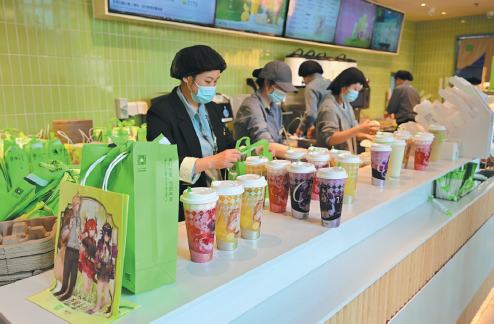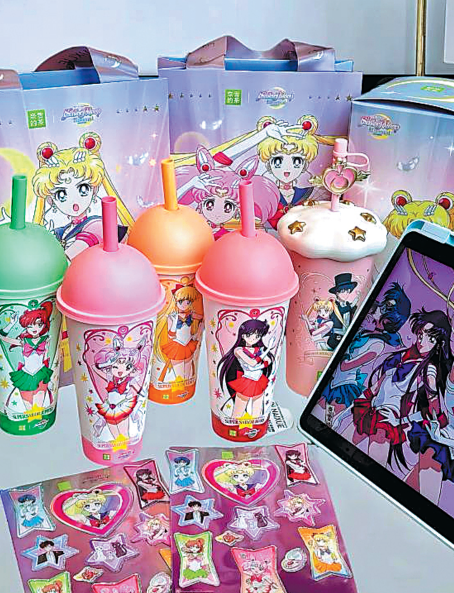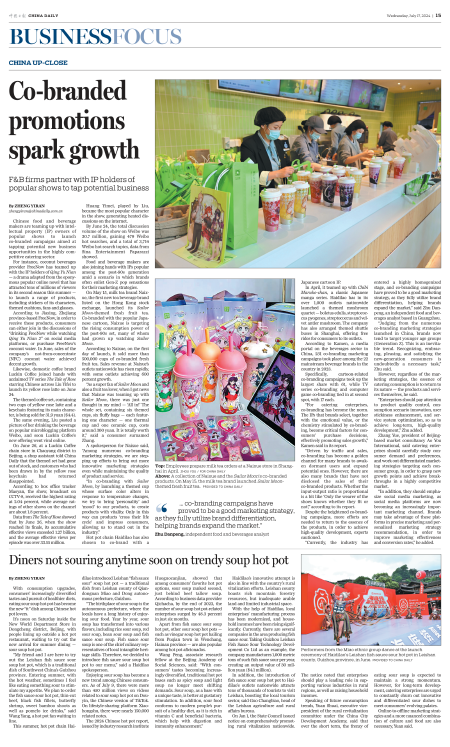
Employees prepare milk tea orders at a Naixue store in Shanghai in April.

A collection of Naixue and the Sailor Moon's co-branded products. On May 15, the milk tea brand launched Sailor Moon-themed fresh fruit tea.

Chinese food and beverage makers are teaming up with intellectual property (IP) owners of popular shows to launch co-branded campaigns aimed at tapping potential new business opportunities in the highly competitive catering sector.
For instance, coconut beverages provider FreeNow has teamed up with the IP holders of Qing Yu Nian — a drama adapted from the eponymous popular online novel that has attracted tens of millions of viewers in its second season this summer — to launch a range of products, including stickers of its characters, themed cushions, fans and glasses.
According to Jiaxing, Zhejiang province-based FreeNow, in order to receive these products, consumers can either join in the discussions of "drinking FreeNow while watching Qing Yu Nian 2" on social media platforms, or purchase FreeNow's coconut water. In June, sales of the company's not-from-concentrate (NFC) coconut water achieved decent growth.
Likewise, domestic coffee brand Luckin Coffee joined hands with acclaimed TV series The Tale of Rose starring Chinese actress Liu Yifei to launch its yellow rose latte on June 24.
The themed coffee set, containing two cups of yellow rose latte and a keychain featuring its main character, is being sold for 31.9 yuan ($4.4).
The same evening, Liu posted a picture of her drinking the beverage on popular microblogging platform Weibo, and soon Luckin Coffee's new offering went viral online.
On June 26, at a Luckin Coffee chain store in Chaoyang district in Beijing, a shop assistant told China Daily that the themed set had gone out of stock, and customers who had been drawn in by the yellow rose keychain had returned disappointed.
According to box office tracker Maoyan, the show, broadcast on CCTV-8, received the highest rating at 2.04 percent, while average ratings of other shows on the channel are about 1.8 percent.
Data from The Tale of Rose showed that by June 26, when the show reached its finale, its accumulative effective views exceeded 1.27 billion, and the average effective views per episode was over 33.55 million.
Huang Yimei, played by Liu, became the most popular character in the show, generating heated discussions on the internet.
By June 24, the total discussion volume of the show on Weibo was 30.7 million, gaining 479 Weibo hot searches, and a total of 3,714 Weibo hot search topics, data from Sina Entertainment Paparazzi showed.
Food and beverage makers are also joining hands with IPs popular among the post-90s generation amid a scenario in which brands often enlist Gen-Z pop sensations for their marketing strategies.
On May 15, milk tea brand Naixue, the first new tea beverage brand listed on the Hong Kong stock exchange, launched its Sailor Moon-themed fresh fruit tea. Co-branded with the popular Japanese cartoon, Naixue is targeting the rising consumption power of the post-90s set, many of whom had grown up watching Sailor Moon.
According to Naixue, on the first day of launch, it sold more than 500,000 cups of co-branded fresh fruit tea. Sales revenue at Naixue's outlets nationwide has risen rapidly, with some outlets achieving 600 percent growth.
"As a super fan of Sailor Moon and also a fruit tea lover, when I got news that Naixue was teaming up with Sailor Moon, there was just one thought in my mind — 'All in!' The whole set, containing six themed cups, six fluffy bags — each featuring one character — one thermal cup and one ceramic cup, costs around 300 yuan. It is totally worth it," said a consumer surnamed Zhang.
A spokesperson for Naixue said,"Among numerous co-branding marketing strategies, we are stepping up efforts to bring out more innovative marketing strategies even while maintaining the quality of product and service.
"In co-branding with Sailor Moon, by launching a themed cup whose surface color alters in response to temperature changes, we try to bring 'personality' and 'mood' to our products, to create products with vitality. Only in this way can products 'cross their life cycle' and impress consumers, allowing us to stand out in the industry."
Hot pot chain Haidilao has also chosen to co-brand with a Japanese cartoon IP.
In April, it teamed up with Chibi Maruko-chan, a classic Japanese manga series. Haidilao has in its over 1,000 outlets nationwide launched a themed mushroom quartet — boletus edulis, streptococcus pyogenes, streptococcus and velvet antler mushroom. The company has also arranged themed shuttle buses in Shanghai, offering free rides for consumers to its outlets.
According to Kamen, a media portal on the beverages sector in China, 231 co-branding marketing campaigns took place among the 22 mainstream beverage brands in the country in 2023.
Specifically, cartoon-related co-branding campaigns took up the largest share with 61, while TV series co-branding and computer game co-branding tied in at second spot, with 17 each.
"For catering enterprises, co-branding has become the norm. The IPs that brands select, together with the emotional value, or the chemistry stimulated by co-branding, become critical factors for consumers' purchase decisions, effectively promoting sales growth,"Kamen said in its report.
"Driven by traffic and sales, co-branding has become a golden channel for many brands to awaken dormant users and expand potential ones. However, there are also many brands that have not disclosed the sales of their co-branded products. Whether the input-output ratio is proportional is a bit like 'Only the wearer of the shoes knows whether they fit or not'," according to its report.
Despite the heightened co-branding campaigns, more efforts are needed to return to the essence of the products, in order to achieve high-quality development, experts cautioned.
"Currently, the industry has entered a highly homogenized stage, and co-branding campaigns have proved to be a good marketing strategy, as they fully utilize brand differentiation, helping brands expand the market," said Zhu Danpeng, an independent food and beverages analyst based in Guangzhou.
"Judging from the numerous co-branding marketing strategies launched in China, brands now tend to target younger age groups (Generation Z). This is an inevitable trend. Recognizing, embracing, pleasing, and satisfying the new-generation consumers is undoubtedly a necessary task,"Zhu said.
However, regardless of the marketing strategies, the essence of catering consumption is to return to its nature — the products and services themselves, he said.
"Enterprises should pay attention to product quality control, consumption scenario innovation, user stickiness enhancement, and service system optimization, so as to achieve long-term, high-quality development," Zhu added.
Zhang Yue, president of Beijing-based market consultancy Ao You International, said catering enterprises should carefully study consumer demand and preferences, and work out differentiated marketing strategies targeting each consumer group, in order to grasp new growth points and achieve breakthroughs in a highly competitive market.
"In addition, they should emphasize social media marketing, as social media platforms are now becoming an increasingly important marketing channel. Brands may take advantage of these platforms in precise marketing and personalized marketing strategy recommendation, in order to improve marketing effectiveness and conversion rates," he added.
zhengyiran@chinadaily.com.cn

